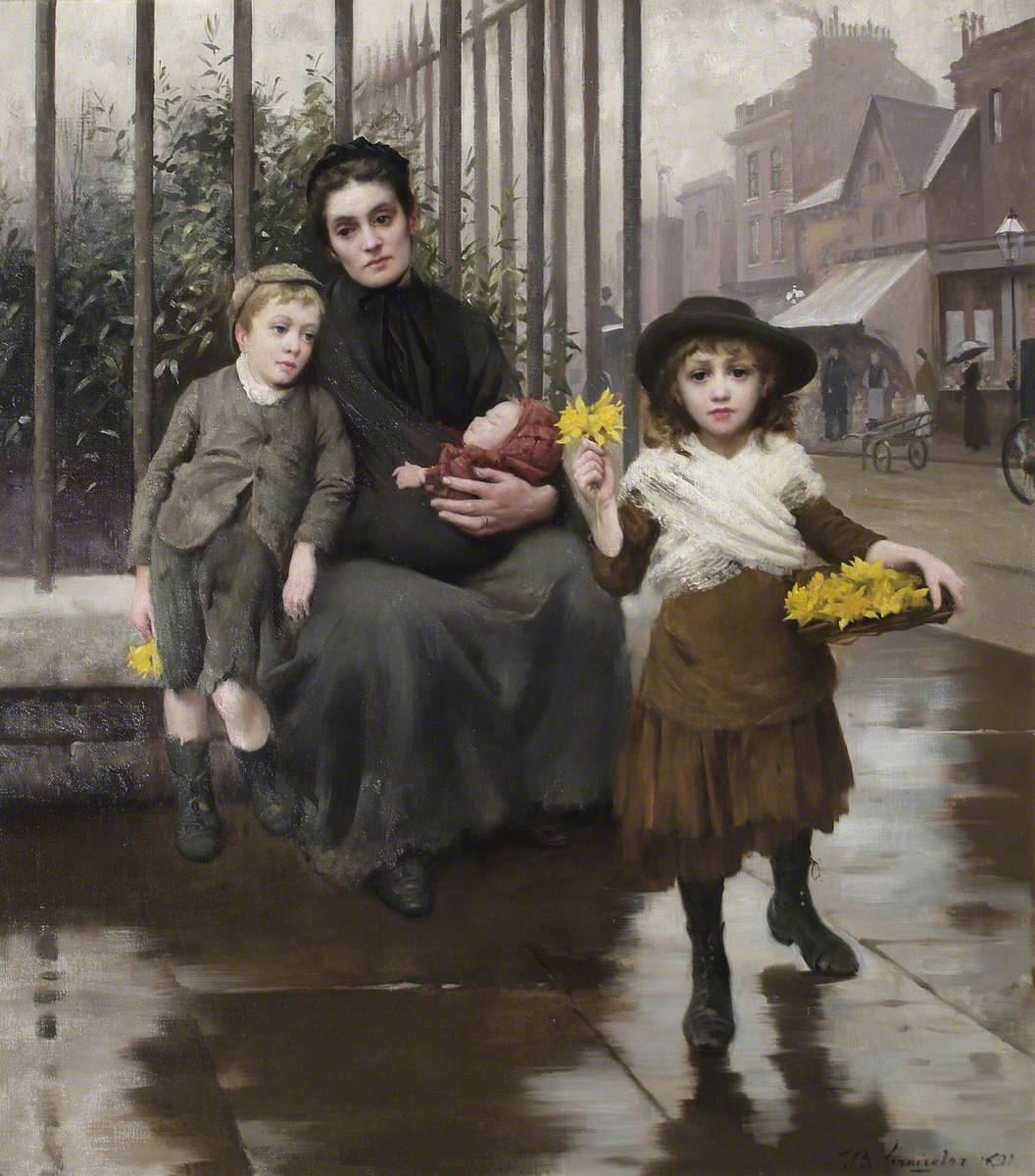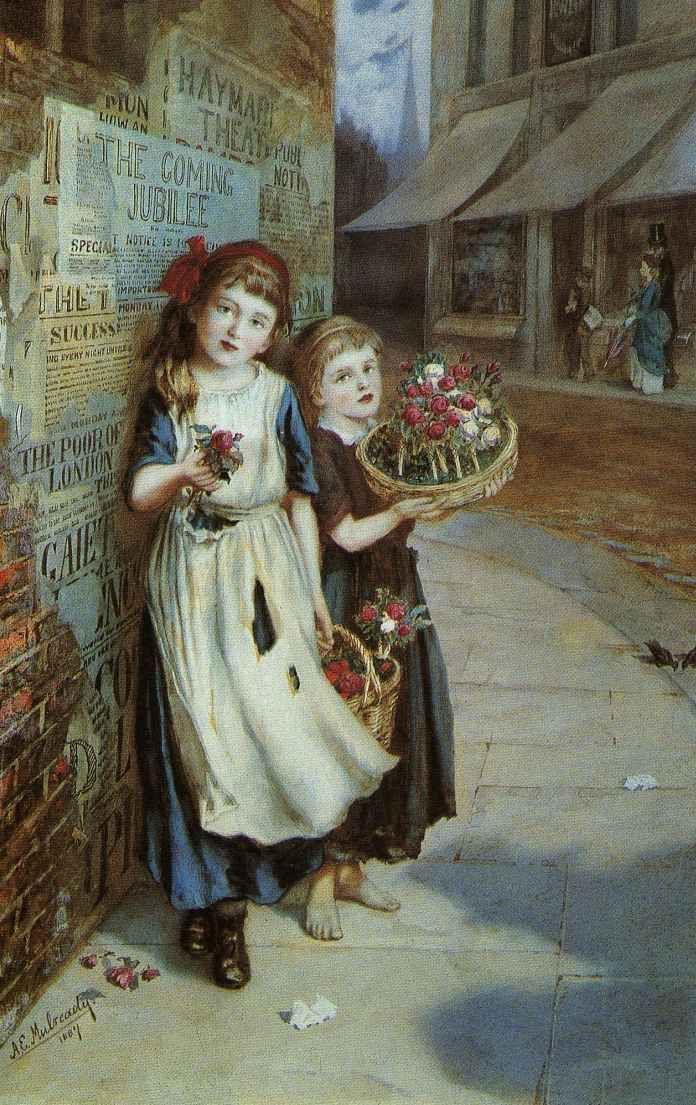Last year when I published a post with the story “The Good Faith of Wei Sheng“ by Ryunosuke Akutagawa (1892-1927) many of you seemed to like it, so I decided to share another one I loved. The story I am sharing with you today, Mandarin Oranges, is less lyrical and more realistic, but it possesses a strength that culminates in the very end with a sentence that I couldn’t forget even after a year of reading the story: It was not until then that I could forget for a while the inexplicable fatigue and weariness, and the obscurity, lowness and boredom of life.
I accompanied the story with beautiful paintings of Victorian flower girls and poor children, which, in my view, suits the mood of the story. I am not an expert in Japanese art to find the Japanese art to follow the story.
 Augustus Edwin Mulready, The Flower Girl, 1872
Augustus Edwin Mulready, The Flower Girl, 1872
“It was a cloudy winter evening.
I was sitting at the end of the seat in the second class car. The train was to leave Yokosuka for Tokyo and I was waiting absentmindedly for a whistle to blow.
As is not usual, there were no passengers except me in the car, which had already been lit inside.
Looking out at the platform, I didn’t see any persons who came for a send-off; only a puppy was sometimes barking sadly in the cage.
Strangely enough, such bleak scenery fit my feeling of that time.
Inexplicable fatigue and weariness were casting their shadow in my mind like the cloudy sky threatening to snow.
I kept both my hands in my overcoat pocket; I didn’t have much strength even to take an evening newspaper out of it to read.
Meanwhile, a whistle blew to signal the departure.

Thomas Benjamin Kennington, The Pinch of Poverty, 1892
Having a slight peace of mind, with my head against the window frame, I was expecting half-heartedly that the station before my eyes would start moving backward trailingly.
But prior to it, I had hardly heard a loud noise of wooden clogs from the gate accompanied by the conductor’s abuse, when I saw a girl in her early teens open the door and come in hurriedly. At the very moment the train swayed heavily once and moved off slowly.
Each pillar on the platform, a water-wagon for a locomotive looking as if left behind, and a porter thanking his customer for the tip —-they lingered but soon fell behind the smoke blown against the windows.
Feeling relieved at last , I opened my heavy eyelids and gave my first serious glance at the girl seated in front of me while I was lighting a cigarette.
She was a typical bumpkin with ichogaeshi-styled dry hair and chapped cheeks so flushed as to look strange.
She hang loosely a spring-green colored woolen muffler over her knees, and on them lay a package covered with furoshiki.
She held it in her frostbitten hands, in one of which she also clasped tightly a ticket for the third class car.
I disliked her vulgar looks.
I was disgusted by her dirty clothes.
And I was displeased by her senselessness of not being able to tell the second class car from the third class car.
So after I lit a cigarette, I took the newspaper out of my pocket and spread it on my knees, for one thing, to forget about her.

Vilko Šeferov, 1928
Then suddenly the light lit on the newspaper changed; it had come from outside, but now it came from the ceiling, making the types of the newspaper appear clearly before my eyes.
Needless to say, the train was entering the first of the several tunnels on the Yokosuka Line.
When I looked over the newspaper under the electric light, I found nothing but routine incidents occurring in the world, which were there to console my gloom.
Treaty of Versailles, weddings, bribery, obituary — I ran my eyes over these dreary articles almost mechanically, under the illusion that the moment the train entered the tunnel in the opposite direction
However, I could not but be aware of the girl sitting in front of me, personifying the vulgar reality.
This train passing through the tunnel, this bumpkin girl, this evening newspaper filled with routine articles— weren’t they all symbols? Didn’t they all symbolize obscurity, lowness and boredom of life?
Coming to feel everything was worthless, I threw away the half-read newspaper and closed my eyes as if dead. I began to doze with my head against the window frame.
Several minutes had passed.

Augustus Edwin Mulready, Little Flower Sellers, 1887
Suddenly I felt as if I had been threatened by something and I looked around in spite of myself and found the girl, who had changed her seat from my opposite to my side, trying to open the window eagerly.
But it seemed that the heavy window would not open up against her wishes.
The chapped cheeks became all the more flushed and some sniffles accompanied with a low breathless noise reached my ears constantly.
It certainly aroused some sympathy of mine.
But it was obvious that the train was right on the point of another tunnel by seeing the mountains on both sides, where dry grass were reflected by twilight, approaching the train window.
Nevertheless, the girl was trying to drop open the window which was closed on purpose.
I couldn’t understand what forced her to do so.
No, I could not but think she was doing out of caprice.
So, with hostility deep inside toward her, coldheartedly I was watching her struggling to open the window with those frostbitten hands, hoping that her attempt would never succeed forever.
Then the train rushed into the tunnel with an appalling noise, at which moment the window was dropped open at last.
And the air , as dark as melted soot, came in through the square opening and , turning into suffocating thick smoke, began to fill the car.

Claude Monet, The Gare Saint-Lazare: Arrival of a Train, 1877
Having a naturally weak throat, I tried but failed to put a handkerchief over my face in time not to be bathed with the smoke. Consequently, I was made to cough so violently that I could hardly breathe.
But the girl seemed not to care about me and looked hard in the direction the train went, making a long neck out of the window with her hair blown in the wind in the dark.
When I saw her in the smoke and the electric light, it was getting brighter and brighter outside the window, from which the cold smell of soil, dry grass and water flew in; otherwise I would have scolded the strange girl without waiting for her excuse and ordered her to close the window though I had been relieved of coughs at last by that time.

Aleksander Gierymski, Jewess with Oranges, 1880-81
But having gone through the tunnel smoothly, the train was coming near the crossing on the outskirts of a poor town lying among the mountains covered with dry grass.
Near the crossing were shabby cramped houses with thatched and tiled roofs.
And in the dusk was fluttering languidly a white flag, which would be waved by a gateman.
It was when I thought the train had passed through the tunnel at last that I saw three red cheeked boys standing closely together in a line behind the fence of the crossing.
They were all as short as if they were held down by the cloudy sky.
And all of them were wearing kimono of the same color as the gloomy scenery of the outskirts town.
They had no sooner raised their hands at the same time, while looking up at the train passing, than they bent their little neck backward and gave an incomprehensible cry with all their might.
Then it happened.

William J. McCloskey (1859–1941), Wrapped Oranges, 1889
The girl, who had leant half her body out of a window, stretched her frostbitten hand and shook it vigorously. Then some five or six mikan, so beautifully sunny-orange colored as to make one happy, showered down on the boys who had seen the train off.
The unexpected scene took my breath away.
And I understood everything at once.
The girl, who was likely to be on the way to her new employer, threw some mikan out of her kimono pocket to reward her brothers who came all the way to the crossing to see her off.
The crossing of the outskirts town in the dusk, the three children cheering like little birds, and the bright color of mikan falling around them – all of them had gone by in a blink.

Henry Walton, The Market Girl, 1776-77
But the scene had been printed on my mind so clearly in a heartrending way.
And I realize a strange feeling of something cheerful also sprang up from there.
I raised my head confidently and gazed at the girl as if she were another person.
Before I noticed, she had sat on the seat before me again , with her chapped cheeks buried in her spring-green colored woolen muffler.
In her hand, which held a big furoshiki, she clasped tightly the ticket for the third class car.
It was not until then that I could forget for a while the inexplicable fatigue and weariness, and the obscurity, lowness and boredom of life.”
________________________________________________________________________________
*mikan, the fruit the girl is giving away, is of Asian origin, also translated as satsuma mandarin, satsuma orange, tangerine and cold hardy mandarin, hence the title.


